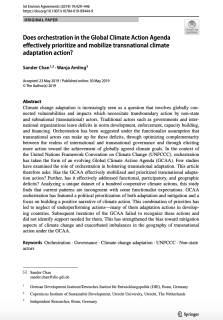
Climate change adaptation is increasingly seen as a question that involves globally connected vulnerabilities and impacts, which necessitate transboundary action by non-state and subnational (transnational) actors. Traditional actors such as governments and international organizations leave deficits in norm development, enforcement, capacity building, and financing.
This article explores whether the Global Climate Action Agenda (GCAA) effectively mobilises and prioritises transnational adaptation action. It asks:
- Has the GCAA effectively mobilised and prioritised transnational adaptation action?
- Has the GCAA effectively addressed functional, participatory, and geographic deficits?
Analysing a unique dataset of a hundred cooperative climate actions, the study finds that current patterns are incongruent with some functionalist expectations. GCAA orchestration has featured a political prioritisation of both adaptation and mitigation and a focus on building a positive narrative of climate action. This combination of priorities has led to neglect of underperforming actions—many of them adaptation actions in developing countries. Subsequent iterations of the GCAA failed to recognise these actions and did not identify support needed for them. This has strengthened the bias toward mitigation aspects of climate change and exacerbated imbalances in the geography of transnational action under the GCAA.
